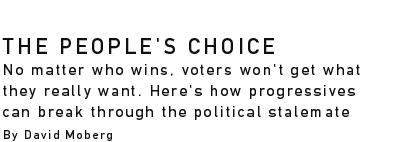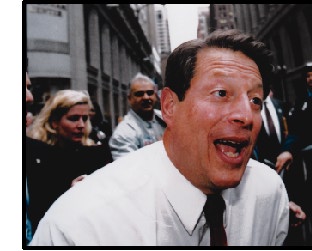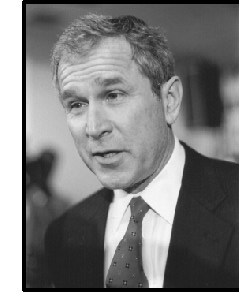
|

|

|

|

|
| |
|
|||
|
When it's hard to determine who even won an election, it's tougher yet to figure out what the vote means. On the surface, the balloting for president and Congress reveals a nearly evenly divided electorate that may end up delivering the most uniformly Republican national government since the '50s. But voters appeared to want something different from what they are likely to get. With Republicans remaining narrowly in control of both houses of Congress and the
But gridlock will not necessarily produce a stalemate. While some observers are already worrying that the new Congress may not accomplish much, a bigger worry over the coming years may be the pundits' favorite nostrum--"bipartisanship." The legitimacy of either man as president will undoubtedly remain in question, especially if Gore's popular vote majority holds up and Bush eventually ends up as the electoral college victor. After all, many Republicans never accepted Clinton as legitimate after two much clearer victories. Yet if Bush is in the White House, a bloc of conservative Democrats, already talking up cooperation, is likely to form a coalition with Republicans, thus dragging Democrats further to the right or provoking sharper conflict within the party. Under the cloak of bipartisanship and "compassionate conservatism," the congressional right would be well positioned to wreak havoc while claiming to enact reform. There is good reason to believe, however, that Americans were not voting for the right-wing agenda that Republicans are likely to promote. Indeed, while it's hard to claim the vote is a mandate for much of anything, there are lots of indications that the center of gravity of American public opinion is moving away from right-wing hostility to government and toward a more positive view of government action. While there were many rumblings of discontent over a variety of issues, polls show that nearly two-thirds of the voters think the country is on the right track, and most give President Clinton at least some credit for the long period of economic growth and low unemployment. But along with the advantages of incumbency, this contributed to a vote for the status quo more than increased support for Democrats. If there was any political direction to the vote, it was slightly skewed in a progressive direction. After all, Bush adopted a Clinton-like strategy for his party with his "compassionate conservatism." He attempted to occupy traditional Democratic terrain on issues such as education, Social Security and prescription drug coverage--but with proposals that promoted privatization of government. However, this reflected a recognition that there is a shift underway in public opinion away from the extreme anti-government politics of Gingrich or Reagan more than a real change in policy. Regardless of the merits of the Republican proposals, the very fact that Bush seemed to be addressing these issues helped to neutralize and confuse Democratic efforts to capitalize on their traditional strengths. And despite Ralph Nader's vituperation against the vice president and the Democrats, it seems fair to say that Gore and Nader supporters shared more goals for government than they did with most Bush voters. Whatever Gore's own shortcomings, people who voted for him did so with the expectation that he would expand federal investment in education, broaden health care coverage, protect the environment and favor working people over the wealthy. Adding together the Nader and Gore votes, there was a clear, if slight, tilt in the vote toward progressive government. Exit polls and some state referenda votes also suggest that voters are looking for better government and more fairness, not less government and laissez-faire. For example, private school vouchers remain the heart of Republican education plans (though Bush avoided the term), but voters in California and Michigan strongly rejected ballot initiatives for vouchers. Also, although nearly 60 percent of voters surveyed by Stanley Greenberg for the Institute for America's Future favored individuals investing Social Security money in private accounts, only 37 percent supported such partial privatization when they realized it could raise the retirement age or lower benefits. The same survey showed that providing universal health care was one of voters' top priorities, far above cutting taxes (especially if told that nearly half of those cuts would go to the richest 1 percent). But not everyone votes on the issues. About one third of voters ranked personal qualities above issues, and more than three-fifths of them voted for Bush. Many voters may not have strongly supported Bush's ideological views, but they simply found Gore untrustworthy or Bush more affable. If there was no ideological majority for the right, the results don't add up as an overwhelming mandate for progressive government either. But they do raise the question of why Gore did so poorly as a candidate from an administration with high public approval presiding over peace and relative prosperity--and who was competing against an inexperienced, dim-witted, weak governor from a state with a dreadful record on the issues that people care about. Gore clearly took the lead after the Democratic Convention with a populist message
Gore and his campaign strategists deserve the blame for his weak showing. Gore would have turned in an even more pathetic performance if it had not been for the unusually strong mobilization by labor and civil rights groups of the core Democratic faithful--African-Americans and union families. Although overall turnout was up only slightly from four years ago, 26 percent of voters were from union households, up from 23 percent; and 59 percent of them voted for Gore (37 percent for Bush and 3 percent for Nader), compared to 44 percent for Gore among nonunion households. Nine out of 10 African-American voters backed the vice president. Without that increased turnout by blacks and union members, Gore would not have even been in the tight contest at the end. Many Gore backers have blamed Nader's campaign for their problems. After all, Nader got nearly 100,000 votes in Florida. Assuming, based on exit polls, that at least 40 percent of those people would have otherwise voted for Gore, Nader's success in Florida took away Bush's lead. The same case that Nader votes deprived Gore of victory could be made in New Hampshire. However, the charge is misleading. Those votes wouldn't have gone to Nader if Gore and Clinton had not so badly betrayed both their promises and the expectations of many reliable Democrats. And Nader's votes don't explain Gore's embarrassing loss of states like Arkansas, Tennessee and West Virginia. Moreover, exit polls indicated that 11 percent of self-identified Democrats voted for Bush (compared to 8 percent of Republicans who supported Gore), but only 2 percent of Democrats voted for Nader. Judging from polling data, roughly half of earlier Nader supporters decided at the last minute to vote for Gore, thus keeping him in the race. It was the disloyalty of conservative Democrats more than abandonment by liberals that really hit Gore hard. Nader backers are right when they argue that Gore is responsible for his own troubles. But without a doubt, if most of them had voted for Gore, he would be president. They had a choice, knowing that either Gore or Bush would be elected, and decided for a variety of reasons that voting for Nader was worth the risk of a Bush win. If Nader voters were consistent, they would not be trying to avoid responsibility for possibly defeating Gore; they would be boisterously patting themselves on the back for doing it. But it is likely that most Naderites would prefer Gore to Bush as president and don't completely believe the rhetoric that there is no difference, even though they're angry and disappointed with Gore and the Democrats. The big danger now for progressives is that former allies will be set against each other. The labor movement has started to reach out more to citizen groups and allies on the left, but Gore's electoral difficulties risk souring relations and endangering the Seattle "Teamsters and Turtles" coalition. Nader's support was overwhelmingly white, and 90 percent of blacks backed Gore. Women supported Nader less than men did, but voted for Gore by the same 11-point margin by which men supported Bush. None of this means Nader's policy ideas were wrong. Indeed, most progressive Democratic constituencies and their organizational leaders would probably agree with much of what he said. While Nader's articulation of those ideas was his campaign's most positive legacy, it is extremely unlikely that the Green Party (or rather either of the two Green Party constellations) can amount to anything significant politically with such little support among the major progressive constituencies--especially unions, African-Americans and other minorities, but also women and poor people. There is a desperate need for the kind of citizens movement that Nader says he wants to create, but there is little chance that the Green Party can become the vehicle for that movement (or even that many Nader voters have any intention of making the Green Party into something bigger). Indeed, there is the danger that the Green Party strategy of attacking the Democrats will undermine progressive political forces at a time when there seems to be a chance of rebuilding a popular movement critical of corporate power. There is always a need for gadfly groups to raise new or unpopular ideas, and citizen groups and leftists often need to mount fights over principle against political and governmental leaders, even when they're in a minority. But the left also needs a strategy to win majority support from the American people. That's the essence of democratic politics. It would be disastrous to revive old warfare between "radicals" and "liberals" over tactical issues, or to retreat into narrowly purist expressive politics, when there is the chance of progressives actually winning majority support for national health insurance, expanded financial aid for higher education, new controls over global corporations and public financing of elections. Rather than indiscriminately attacking the Democratic Party as an institution, there is more to be gained by supporting progressives within the party and challenging conservative Democrats in primaries. In any case, progressives won't make any headway in winning elections as Democrats, Greens or anything else, without first winning public financing of elections and other electoral reforms (including provisions for proportional representation, instant runoff voting and other mechanisms that would give minority parties a meaningful chance). More important, whether they supported Gore or Nader, progressives need to put aside any bitterness about electoral strategies and build organizations that can fight effectively on major national issues. After all, the real battle is with corporate power. As the Wall Street Journal reported, the drug lobby this year "waged the biggest and costliest corporate campaign in U.S. political history, spending more than $80 million to keep the Democrats from regaining control of Congress. And they won." The movement against corporate globalization has demonstrated an ability to operate on many levels at once--winning widespread public support, mobilizing large institutional forces like labor unions and major environmental groups, engaging in effective legislative lobbying, taking advantage of intraparty ideological divisions, generating grassroots energy, and employing militant tactics in the street. So far there has been a tenuous success in keeping disparate strands and factions together and winning at least a few victories, despite overwhelming odds. The same kind of mobilization for health care, the right to organize unions, campaign finance reform and global warming could transform politics by putting pressure on politicians, especially in the Democratic Party, and by educating the public, which is generally sympathetic to progressive solutions but open to corporate propaganda (as in the cases of prescription drug coverage and individual investment of Social Security funds). It is the job of progressives not just to criticize the shortcomings of politicians, whatever their party, but to create the social climate that forces politicians to act. There is a chance now, if bickering and infighting on the left
can be minimized, to mold an indeterminate but ultimately sympathetic
public into a progressive political majority. These broad campaigns,
carried on as much in between elections as during them, will be
necessary to break through the political stalemate and win progressive
victories, no matter who ends up in the White House.
|



